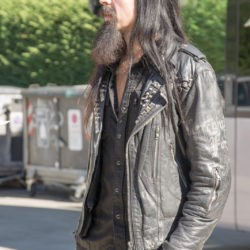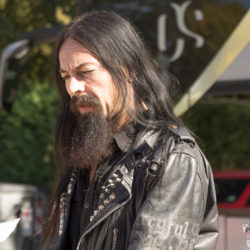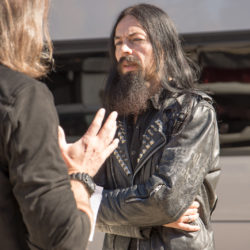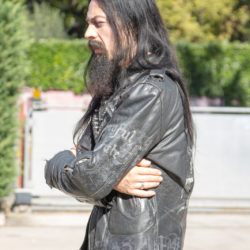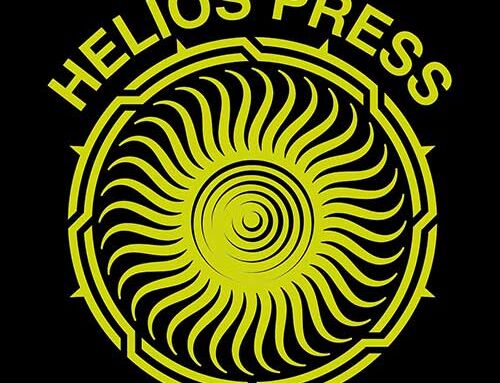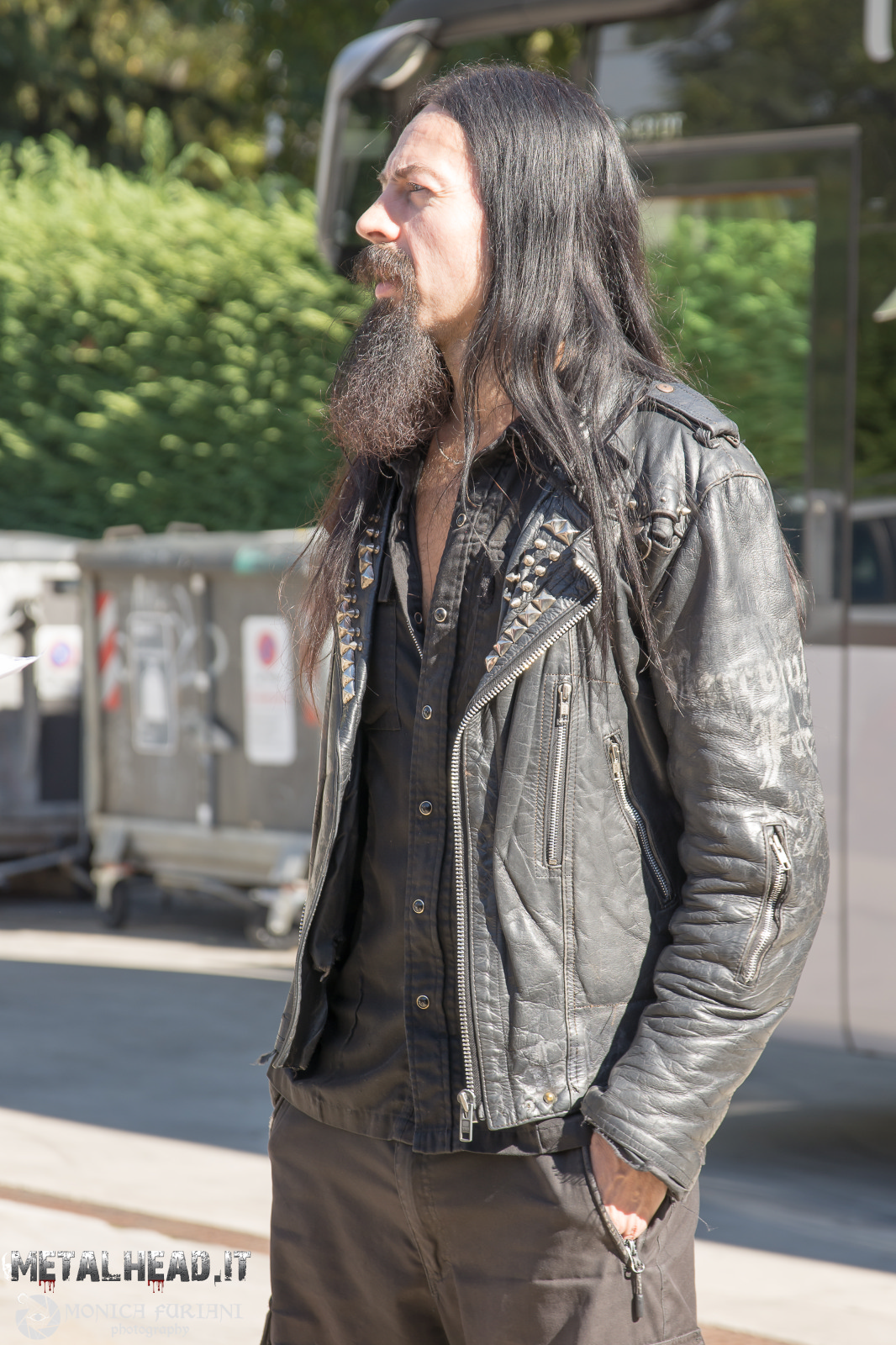 Satyricon have played here last October and are coming back soon, the upcoming March. After 9 albums and over 25 years of career, is undoubtedly one of the most symbolic band in the extreme music universe, one of the darker stars in the Norwegian black metal galaxy. But the business out there is nasty, and the intelligent attitude of Satyr and Frost is often misunderstood, badged, or wrongly rated. So, having had a very deep and interesting chat with Frost back in 2015 (read here), “Live At The Opera” age, I continued discussing our topics, going deeper, going further. We ranged from the new album to the scene, from the friendship behind the band to health, life and vision of both past and future, present included. Frost preferred to be interviewed outside, in the warm sun of a warmer early autumn, and he almost gave me more answers than the amount of questions I asked. Once gain, one of the fastest and grooviest drummer of the scene. This is Satyricon. This is Frost. (qui la versione in italiano)
Satyricon have played here last October and are coming back soon, the upcoming March. After 9 albums and over 25 years of career, is undoubtedly one of the most symbolic band in the extreme music universe, one of the darker stars in the Norwegian black metal galaxy. But the business out there is nasty, and the intelligent attitude of Satyr and Frost is often misunderstood, badged, or wrongly rated. So, having had a very deep and interesting chat with Frost back in 2015 (read here), “Live At The Opera” age, I continued discussing our topics, going deeper, going further. We ranged from the new album to the scene, from the friendship behind the band to health, life and vision of both past and future, present included. Frost preferred to be interviewed outside, in the warm sun of a warmer early autumn, and he almost gave me more answers than the amount of questions I asked. Once gain, one of the fastest and grooviest drummer of the scene. This is Satyricon. This is Frost. (qui la versione in italiano)
MH: Hello! I wanted to somehow continue the interview I had with you two years ago. First of all congratulation for the new album. I personally reviewed and top rated it (here). “Deep Calleth Upon Deep”. This title is a biblical title. How comes you guys went for this?
F: It’s simply a title that fits the contents and the essence of this album. You know, simply because a term or a sentence exists in the bible doesn’t mean that’s all of what it is about. The reason for this becoming a title has to do with a very very small episode taking place… more a trivial… this is very close to the finishing of the recording of the album, so we were like at the very final stage here… and Satyr was just reading an article where this term… which is a quote from the bible… occurred. As he was reading it, he just said ‘this is the title of our album, right here’. That’s exactly it. It’s an album that comes from the deepest dark of us, we have like brought it all the way from down the deepest recesses of our being. We communicate that to the listener, it’s that kind of album that requires awareness and attention of the listener. When it gets done, it takes it ways through the deepest structure of consciousness, perhaps down to the subconsciousness and that’s really where this album works. So … you also have this latin saying I guess which might be… the original… I guess you know it, as an Italian you probably know it…I’ve read it several time… like ‘Abyssus abyssum invocat’ or something… yes… it’s really what it’s all about.
MH: The bible psalm (42:7) continues, next verse: “at the noise of thy waterspouts: all thy waves and thy billows are gone over me.”. It’s quite strange but it sounds like a typical black metal lyrics. Indeed it’s so deep in a way, but the press, the people, sometimes aren’t agreeing about whether you are doing black metal or not. Where do you put Satyricon nowadays, in the scene, with the music and the inspiration you got.
F: If you ask me you will get a very simple and straight forward answer: this is black metal that be it. And I don’t understand how there’d be doubts about it. If this isn’t, then what is? We have never made an album being so dark and twisted, and haunting. So profound and deep and so menacing… and so sinister and foreboding. So what more do you request of it really, I mean, “Deep Calleth Upon Deep” is to me a million times more dark and scarier than “The Shadowthrone”, to pick an example. I won’t to start to debate about what is darker, because … I just want you to understand my …. if what defines it, is the substance of all the music, how couldn’t this be black metal. Some people still in 2017, has this weird idea that black is about corpse painting, blast beats, or the use of symbolism. I don’t meet that many, but they still exist. I can understand if a 16 years old thinks that way, but black metal as it is now has existed for long time and many other bands would have been there for a long time and those who now commence would play on and to a world of music that has roots but also a long history up to here and now. I think there must be a different level of understanding now. It’s really that substance which is all about. Sometimes I say it is pretty much similar to blues? At least on the attitude. In blues it’s also about the feeling, right? You got no feelings? You got no blues. It’s the same thing here. It doesn’t matter if it is extreme or how far you have your sound reaching. That not what defines it. Whether you use corpse paint or not, is not what defines it. Whether you are labelled as satanic or not, is not what defines it. It’s really conceived spiritually what kind of substance do you find there. And to me the substance of “Deep Calleth Upon Deep” is pretty much similar to the hard core substance of what I think black metal is all about.
MH: and anyways you still pack venues with black metal fans despite whatever they say…
F: So in one way I don’t care about how people call it, because whatever they experience, whatever they feel is what matters. But I still don’t have an opinion to come across because black metal is actually a genre that I had grown up with, had passion for it. I still do. And all Satyricon thinks the same way. And we feel ourselves that we carry some sort of legacy which is connected to this genre, and we are proud of that. Sometimes, perhaps, it’s worst to express that opinion than take another way actually.
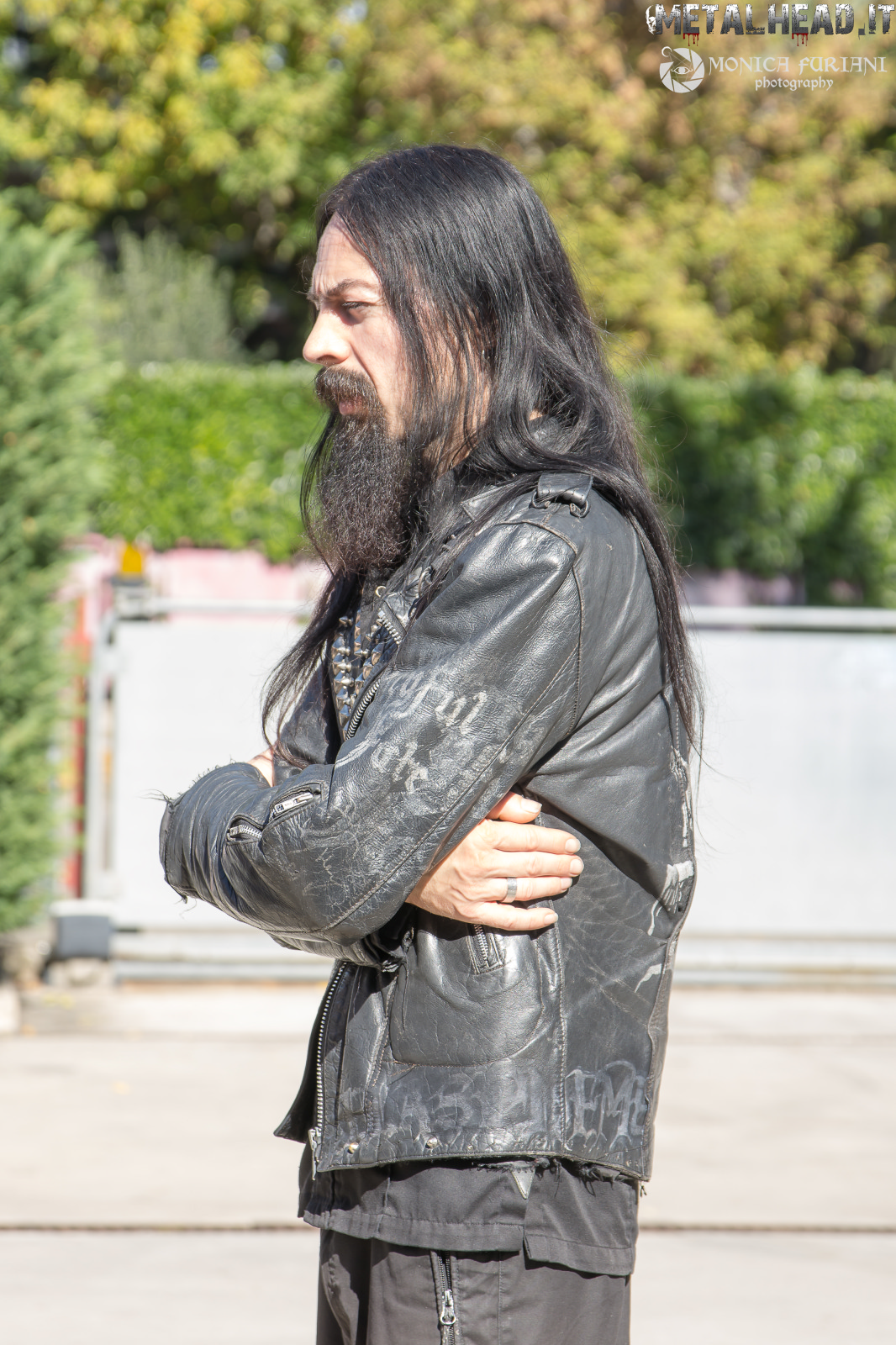 MH: Well I connect to what we said two years ago. You told me that time, after the release of the Opera album, that you were thinking to be doing a cover album with a very weird cover choice, you told me. Well, where did this idea go since now we got a new album with originals again.
MH: Well I connect to what we said two years ago. You told me that time, after the release of the Opera album, that you were thinking to be doing a cover album with a very weird cover choice, you told me. Well, where did this idea go since now we got a new album with originals again.
F: Well, this new album came just to cover. We initiated the cover album project. Because as far we picked six songs, I think we even started to rehearse
MH: So it is still under work…
F: Yeah. But eventually we were inspired to start write music of a studio album. That became more important. But we’ll return to it when it feels due.
MH: Everybody knows that Satyr has had some health issues. Apparently he is doing fine since he is touring. How did this condition influence the new album?
F: Oh. That’s too hard to say because it affects a subconscious level. We really don’t really know how it comes to express itself or how it influences and what’s going on. If anything I think that his brain tumor made us feel that Saryricon is even more important. Because it confronts you with also the finality…
MH: the mortality of the man…
F: Yes! And in the end you never know for how long you can go on. When you’re young you feel like you’ve all the time in the world. But when you have experiences like that, with something that is potentially fatal, then you are forced to realize it. Now it’s not that way actually. You might be having that lucidity to carry on taken away from you anytime, so it’s better to invest all that you have everyday for, as long as you you’re not gone. It might not be that it prevents the machine from rolling, but it might be that your health is weakened and you cannot carry on what you do. I mean, this takes a lot. It takes physical and mental presence. And if that challenging you too badly, perhaps you have to do something else with the rest of your time. At least as long as we manage to do this and keep it up, let’s try to see if it’s possible to give more than 100%. Like trying to give 110%. Like bring on those extra resources.
MH: Again two years ago you told me something that interested me. You said you hadn’t a steady setlist for a tour, kind of you had more combination of songs… Well I checked the setlist of the last gigs of this tour, and I see it’s always almost the same. So I’d like to know where this idea went. Or how you do manage this side.
F: What we have decided to do now we put emphasis on the album. So we have several song from that album that we play every night. It feels right to open always with “Midnight Serpent” and to have a string of song following that, and we do other songs from the album that we feel are essential, and we have also songs that we take in and out… so there would be songs of the album that we play tonight that we didn’t play yesterday, for instance. And we have also started to rehearse and jam some older songs, we started to look at the arrangements, twist them and we will bring them into the setlist. So we try to have a list that is a little more firm because we are now touring with an album, which is a new studio album; like the last time we had this opera album going on and we were more… at the label geeks… to bring song in and out because we didn’t really have new material, we had new arrangements that we brought there… but it’s all different now, as this new album dictates slightly the setlist, which is not locked and it changes a little day by day.
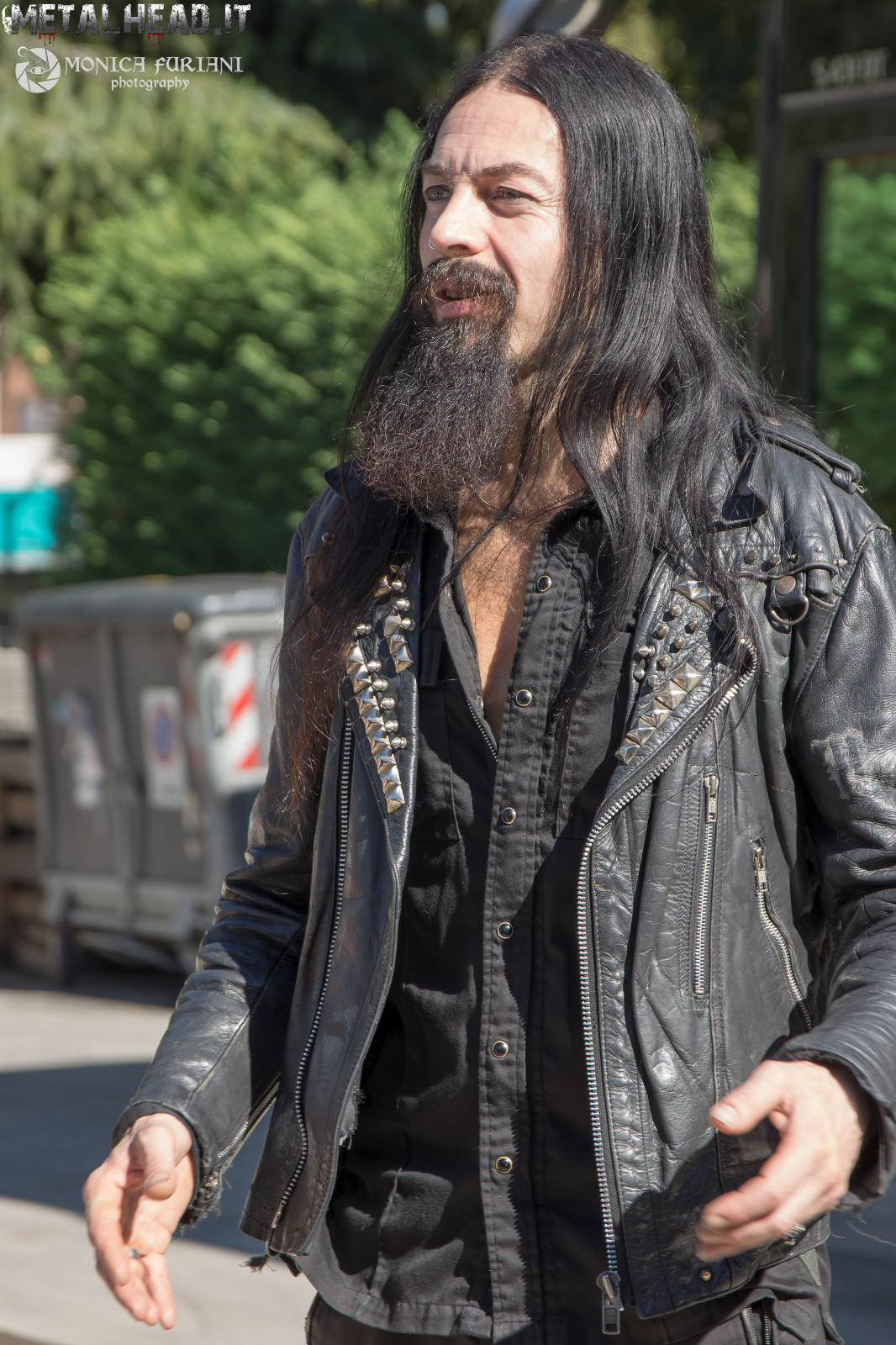 MH: Still two years ago, we and you agreed that “Phoenix” is a fantastic song, and you told me you could have other guest vocalists. Well in the new album there’s no guest vocalists at all..
MH: Still two years ago, we and you agreed that “Phoenix” is a fantastic song, and you told me you could have other guest vocalists. Well in the new album there’s no guest vocalists at all..
F: (laughing, editor’s note) yes, there is!
MH: well, not lead singers I mean!
F: this is true, yes!
MH: So, what about any plan to have more guest lead vocalist, maybe in the future, maybe in a new album, maybe in the cover album…
F: Yeah, for the cover album that’s confirmed. We seldom have that type of plans. We are open to collaborations whenever that feels worth. Basically, you know, we are a band, we make our own songs and we perform our own songs and that’s the foundation for it all. If for some reason we feel that we need to bring in some external forces to make it all work or if we are inspired to do that, or some kind of chances present to ourselves, we are always open to that. And that might happen again: we had ideas of doing something in the same lines… with this turn or at least with this album… but it actually turned out to be better to have Satyr doing all the lead vocals and just to add some vocals as a sort of musical textures, and it preserves the character of the song… character of band…actually… that was what felt best this time.
MH: Still about the guests. In this album you have a lot of extra instruments, like the sax, which I loved, the clarinet, french horn, etc. But they are somehow in the background, it’s not like say Enslaved bringing them on the lead.
F: Yes
MH: The sound is black metal and harsh but this gives some kind of vintage feeling, if you want, do you think you will boost the extra instruments in the future, with higher volume if you want, putting them in the lead?
F: Yeah, it follows what I said earlier, we are open to such things if it feels alright. But when we made the music for “Deep Calleth Upon Deep” all the songs were made for a rock band. Meaning guitars, bass, drums and vocals. Our intention was simply to be, you know, a kick-ass band playing kick-ass songs! To be simple about it? When we had written most of the material it felt there was also space for actually adding something. We started to realize that there wasn’t much atmosphere and emotion, some spirit in the song. Perhaps it could be uplifted a little, just incorporating some subtle textures and we tried out some different solutions cooperating with various people we do have in our network. And these people they came up with some arrangement, and some of them we found, you know, really brought in something fine into the song. And then Satyr brought those elements in as part of composition, which happened on the very last stage and the song were already written, they were never made in order for there to be saxophone, those instruments or any such things, you know, to play a central role. It was always the band in the lead. And we want to keep it that way. So when those textures are added, they were added as something to, in subtle way, put emphasis on what was already there in the songs, perhaps to add something, a sense of dramatic or to enhance atmosphere.
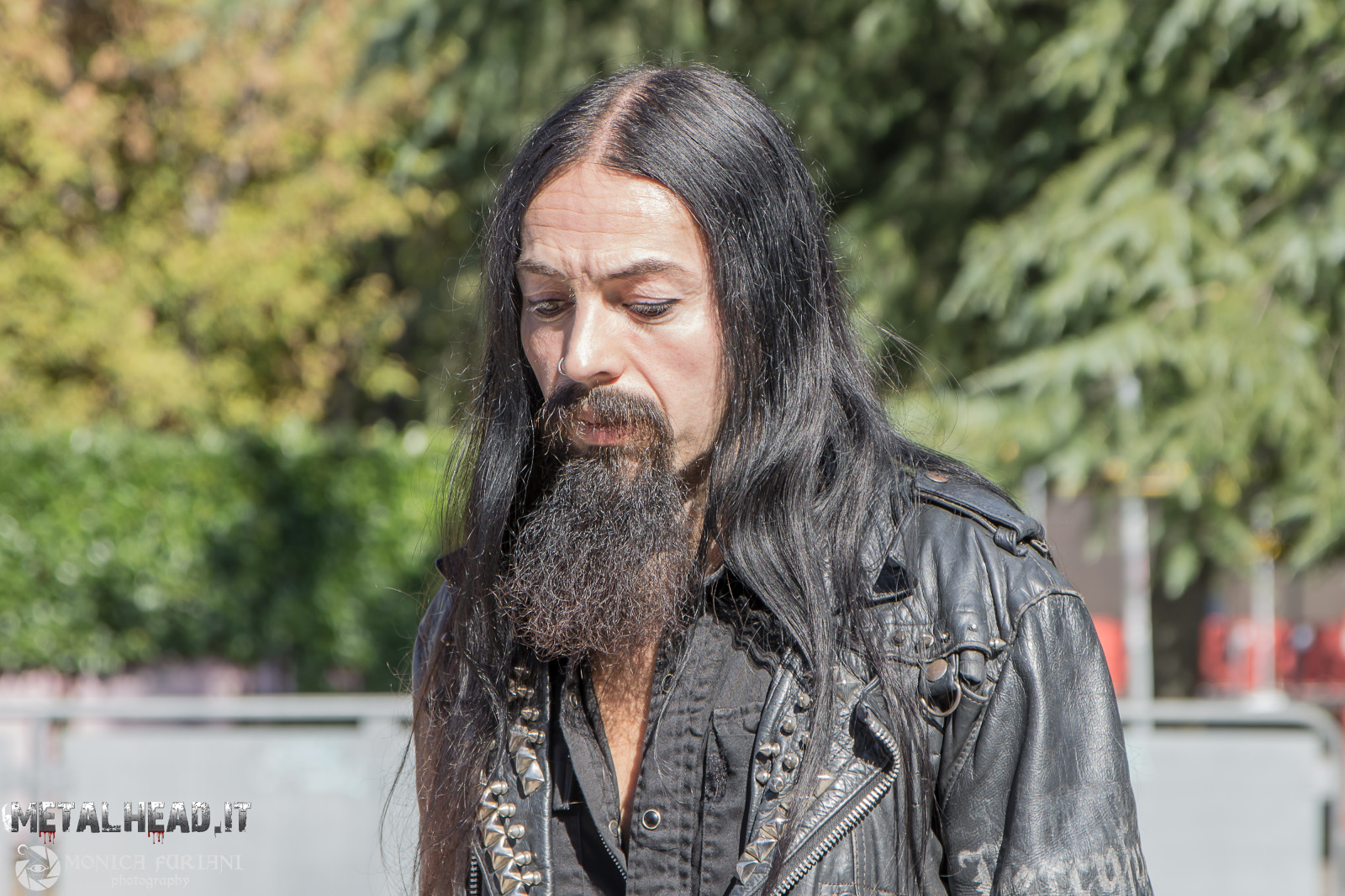
MH: Why Edvard Munch. And why one of its less colorful paintings?
F:It’s… that was happening … it was quite similar to the one related to the album title. At the same time Satyr got access to a web catalog of various works of Munch. As he saw the picture he just realized … that this has to be the cover… this is the visual expression of the album.
MH: I got a personal question for you. How do you balance your musical life with Satyricon and 1349?
F: It works fine. I know exactly my role in the two different bands and don’t mix them. The history with Satyricon goes back to 1992, and will remains my first priority as long as it exists as a band. But whenever I am with ‘349 I am also 100% dedicated to that, it doesn’t feel like a hobby project when I’m there, if you get my meaning…
MH: so instead of a side project, you got two projects in a parallel way…
F: whenever I am there, I am there. Fully. But Satyricon has to remain as a priority.
MH: To close: it’s over 25 years that you and Satyr are together in the same band. What’s the secret?
F: We have a genuine passion for what we do. A genuine passion for music. A genuine passion for Black Metal. And we also have a very very deep respect for each other, and we have this fine balance between being strictly colleague and being friends.
MH: Which is not easy.
F: Exactly! If we were like the best of buddies type, hanging around together on our spare time… that would kind ruin the chemistry. But it’s more like we can hang out every now and then, and we can really be, you know, best friends, but then there could be other times where we operate in our own and we are very different… and I think that’s important, we are not getting two of my type, two of Satyr’s type… we have realized what our different positions are, and we respect it. So we have a deep respect for what we have achieved together and for our life’s work.
MH: Thanks. Please, a message to our readers and your fans…
F: I say what I always say. I hope to see people when we are around, but what I do back there on the drums playing with Satyricon is more important. Anything I can tell you…
(Luca Zakk)

